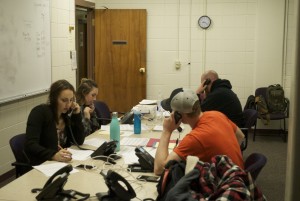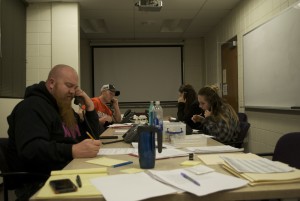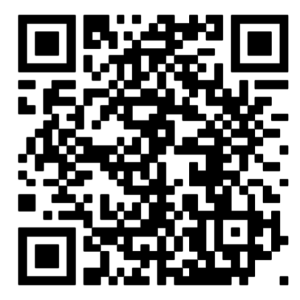The Colorado State University Police Department is asking students to share their views on how well it’s doing.
A faculty member in the Department of Sociology and a team of his grad students are surveying CSU students about the department and its programs — as well as safety on campus.

“We may think we’re doing a good job,” says CSU Police Chief Scott Harris, “but until we hear from people who are objective, we won’t get a real sense of whether there is anything we could do differently.”
Harris, who spent 37 years in law enforcement in Albuquerque, New Mexico, before coming to CSU, says he’s seen such surveys play a useful role in making informed policy decisions.
“If we have a common response to one of the questions, we need to take a close look at that and make a change, if appropriate,” he says. “I hope people will be honest with us and tell us what they think. How can we enhance the services we provide you?”
Sociology Professor Prabha Unnithan and three of his Ph.D. students are wrapping up a phone survey they started in November, targeting more than 800 randomly selected CSU students. And they’ve just launched an online version of the survey that all students are invited to complete at http://col.st/EqHcU.
 The Ph.D. students — Ian Greenwood, Jeb Potterf and Chris Moloney — say they have conducted more than 200 surveys on the phone with the help of 10 undergraduate callers, and they hope for a big response to the Web-based questionnaire, which allows students to remain completely anonymous.
The Ph.D. students — Ian Greenwood, Jeb Potterf and Chris Moloney — say they have conducted more than 200 surveys on the phone with the help of 10 undergraduate callers, and they hope for a big response to the Web-based questionnaire, which allows students to remain completely anonymous.
“The more students that respond the better — this is their opportunity to speak their minds, good, bad or indifferent,” Greenwood says.
In addition to giving a general assessment of how the police department is doing, respondents will answer questions about areas on campus where they don’t feel entirely safe. They’ll also be asked about the department’s current programs, like SafeWalk, and programs they’d like to see added. The online survey is expected to take 7-10 minutes to complete.
One of Unnithan’s undergraduate classes was involved in the development of the questions last summer; the students were asked to circulate the language among their friends and offer edits.

“I think that’s partly why we’ve gotten a good response rate, because students were involved in the phrasing, how the questions were asked,” Potterf says.
“It teaches them about the survey methodology that they learned in class,” Greenwood adds.
“A couple of them even ended up being callers,” Unnithan says. “They saw the process from beginning to end, and several are going to write papers about it. I’ve had some tell me how valuable it was to see the research process unfold.”
Harris expects results of the survey to be available next fall.
“We welcome responses from the people we serve, and we will take them seriously,” he says. “We want to be accountable and transparent, and foster that open relationship.”
Funding for the survey was provided by CSU’s Public Safety Team and the Division of University Operations.